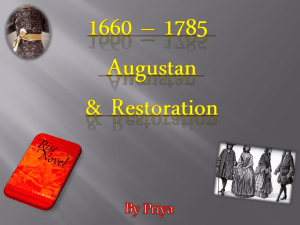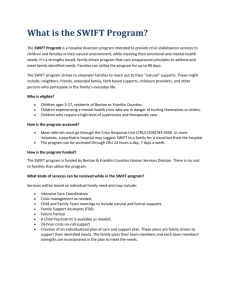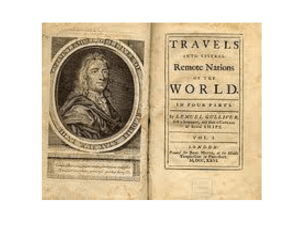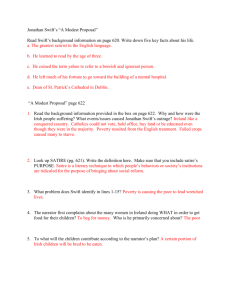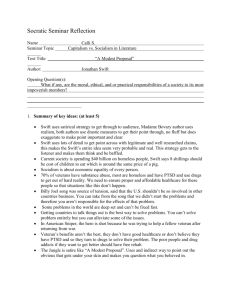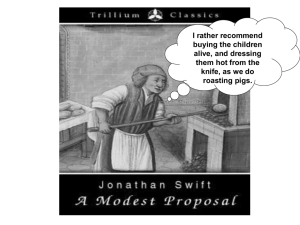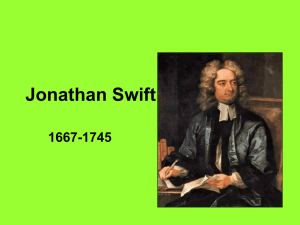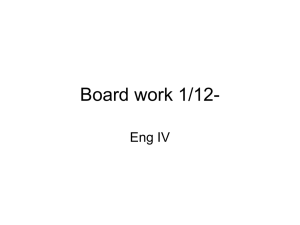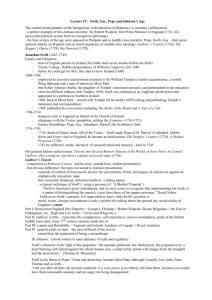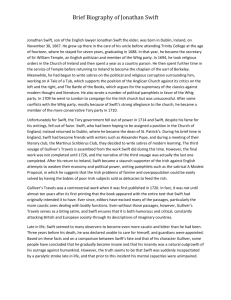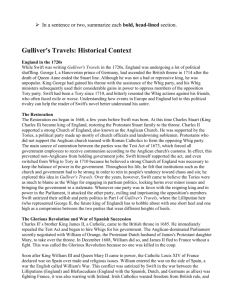Document
advertisement
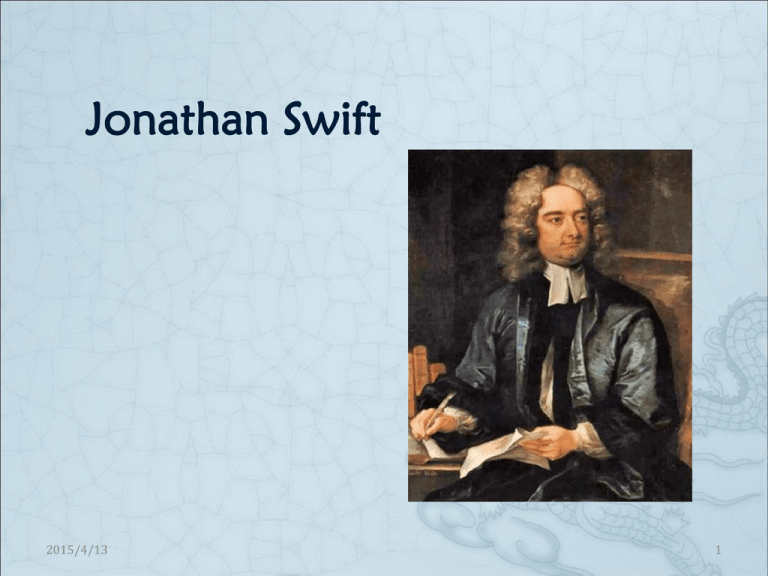
Jonathan Swift 2015/4/13 1 Contents 2015/4/13 1. Life 2. Works 3. Achievements 4. The story of Gulliver's Travels 2 1. Life Family background and education Relations with Sir William in England whigs Social activities Tories Irish exile 2015/4/13 3 Family background and education Jonathan Swift (1667 ~ 1745) was born in Ireland of English parents and, after studying at Trinity College, Dublin, he entered the household of Sir William Temple, a retired diplomat, as a secretary. 2015/4/13 4 Relations with Sir William in England His relations with Temple were close but difficult, and Swift left at one point to become an Anglican parish priest in northern Ireland. Upon his return to England he remained with Temple until the latter's death, helping prepare Temple's works for publication and writing his own remarkable first volume of satire, which included A Tale of a Tub and The Battle of the Books. 2015/4/13 5 Social activities In 1707 Swift was sent by the Church of Ireland to seek financial benefits from Queen Anne; during his years' stay in London, he became accepted as a man of letters. When he returned to London in 1710, he left the Whigs and gave his support to the Tory ministry of Robert Harley, later Earl of Oxford, on the grounds that the Whigs might sell the church short in their encouragement of Dissenters. For most of the four years that followed, Swift became a principal spokesman and propagandist for the Tories. He became a leading spirit in the Scriblerus Club with Pope, and he was able to win patronage for friends in difficulty, Addison among them. With the fall of the ministry, Swift (who had been appointed Dean of St. Patrick's Cathedral, Dublin, in 1713) began his long Irish exile. He became in some measure an Irish patriot, trying to stir the Irish to self-respect and to resistance against English exploitation. 2015/4/13 6 2. Works In 1726, he publicized Gulliver's Travels, which contained his strong political satire, and he had a hand in encouraging both Gay's Beggar's Opera and Pope's Dunciad in the following years. Throughout his lifetime Swift created a body of distinctive poetry. At the end, a disease of the middle ear disturbed his sense of balance; he was cared for by others until his death. Swift's important works include The Battle of the Books; A Tale of a Tub; The Drapier's Letters, A Modest Proposal and Gulliver's Travels. 2015/4/13 7 3. Achievements The greatest ironist Master of English prose 2015/4/13 His characteristic device 8 The greatest ironist Swift is the greatest ironist in English literature, and he has as a result been accused of all the malevolence and blindness that resentment can invent. He does not allow man much comfort or dignity, and he cruelly reduces grand pretensions to systematic follies and mechanized brutality. 2015/4/13 9 His characteristic device In fact, Swift's characteristic device is to invent some rational basis for the behavior that men fall into unthinkingly or self-indulgently; by rationalizing folly, by finding eloquent arguments for the unspeakable, Swift divorces intention (usually noble) from achievement (somewhat shabbier) and shows what one would have to intend if one were to undertake deliberately what men in fact accomplish. So the most important characteristic of his writing is that his satire is usually masked by an outward gravity and an apparent earnestness which renders his satire all the more powerful. 2015/4/13 10 Master of English prose Swift is one of the greatest masters of English prose. He is almost unsurpassed in the writing of simple, direct, precise prose. His style is really “ proper words in proper places. ” Clear, simple, concrete diction, uncomplicated sentence structure, economy and conciseness of language mark all his writings. 2015/4/13 11 2015/4/13 12
